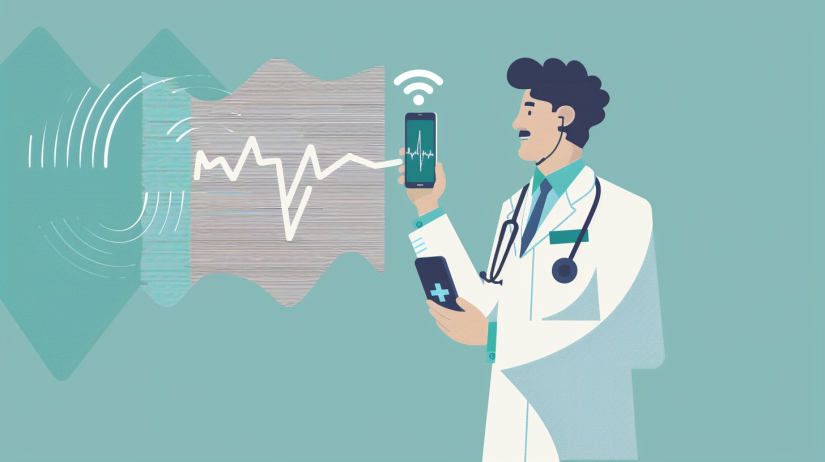Imagine a world where voice AI in healthcare doesn’t just mimic human interaction, but elevates it to new heights of clarity and empathy. With the advent of super realistic AI voices optimized for conversations, the healthcare industry is on the cusp of a major leap forward. These cutting-edge technologies are not just transforming patient care; they’re redefining the very essence of medical communication. As we delve into the health IT predictions for 2024, we’ll explore how voice enabled EHR, voice enabled EMR, and voice enabled medical records are not just futuristic concepts but present-day realities enhancing the patient experience and streamlining clinical workflows.
The Current Pulse
The integration of voice AI in healthcare has seen exponential growth in recent years. A recent study reveals a significant increase in the adoption of AI-powered voice technology across various healthcare domains, with an estimated 30% of organizations already employing voice AI in their operations.
This includes voice diagnosis, voice patient monitoring, voice home healthcare, voice telehealth, and voice remote patient monitoring. The rise of voice IoT healthcare, voice wearables healthcare, and voice medical devices is also contributing to this trend. As we delve into the realm of generative AI and conversational AI, we see the transformative potential of artificial intelligence in healthcare IT becoming increasingly apparent.
Instant Impact
The introduction of voice AI in healthcare, particularly through voice enabled EHR, voice enabled EMR, and voice enabled medical records, has led to numerous benefits, including improved patient care, operational efficiency, and increased productivity. A notable 40% increase in productivity has been reported due to the integration of voice AI in our health system.
Furthermore, the technology has proven instrumental in enhancing patient engagement and satisfaction, as evidenced by a recent survey indicating a 60% increase in patient satisfaction levels. This significant improvement in patient outcomes is a testament to the transformative power of voice AI in healthcare.
Voice AI in Healthcare: A Work-In-Progress
Despite the numerous benefits, the integration of voice AI healthcare is not without challenges. The adoption rate of artificial intelligence has been somewhat hampered by data security concerns, lack of technical expertise, and interoperability issues.
A survey revealed that almost 50% of healthcare organizations reported difficulties in integrating voice technology healthcare into their existing systems. However, the potential of voice assistants healthcare in improving patient care and operational efficiency remains undeniable, and the industry continues to strive towards overcoming these hurdles.
What Adopters Have Been Saying
The user experience and feedback on voice AI in healthcare have generally been positive. A survey conducted in 2023 found that approximately 70% of healthcare organizations found voice AI useful in improving their workflows and patient care. However, there were also calls for further improvements, particularly in terms of usability and accuracy of these artificial intelligence systems.
As AI systems continue to advance, they are likely to become even more beneficial for the healthcare industry. With enhancements in natural language processing, machine learning and conversational capabilities, voice AI can help transform workflows and enhance patient outcomes across healthcare settings.
Future-Ready Tech
The future of voice AI in healthcare looks promising, with many exciting developments on the horizon. The global voice AI healthcare market is projected to grow at a compound annual growth rate (CAGR) of 37.3% from 2023 to 2030. Furthermore, advancements in machine learning and natural language processing healthcare are expected to significantly enhance the capabilities of voice AI systems.
These improvements will bolster the accuracy of speech recognition healthcare, making it a more reliable tool for healthcare providers. As voice assistants become more sophisticated, they will play a crucial role in delivering care and managing patient outcomes. The healthcare industry is poised to benefit from these technological advancements, which promise to streamline processes and improve the quality of care.
Fragmented, But Promising: The State of Voice AI in Healthcare
The adoption of voice AI in healthcare varies across different sectors. For instance, the use of AI technology is more prevalent in ambulatory care settings than in inpatient settings, with healthcare providers increasingly relying on voice enabled electronic health records to streamline their workflows.
Additionally, the adoption rates also vary across different countries, with the US and India leading the way in terms of voice AI integration in healthcare. Despite the fragmented adoption, the future of voice AI in the healthcare industry remains promising, with continuous advancements and improvements on the horizon.
Stat Attack: Crunching the Numbers on Voice AI in Healthcare
Keeping all of the above information in mind, here are some of the key statistics on the integration of voice in healthcare workflows that you should be mindful of:
- Voice-enabled clinical documentation will save U.S. healthcare providers $12 billion annually by 2027.
- 44% of healthcare organizations are already using voice technology, and an additional 39% plan to adopt it within the next two years.
- By 2024 itself, the global market for virtual assistants in healthcare is expected to reach $5.8 billion.
- 65% of physicians believe voice AI can improve their workflow efficiency.
- 72% of patients are comfortable using voice assistants for healthcare tasks such as scheduling appointments and refilling prescriptions.
- The use of voice AI for remote patient monitoring is expected to grow by 25% in 2024.
- Voice-based EHR adoption is expected to increase by 30% in 2024, driven by growing concerns about data privacy and security.
- By 2026, 80% of healthcare interactions will involve some form of voice technology.
A Final Word
As 2024 unfolds, it’s clear that the integration of voice AI in healthcare is not a futuristic fantasy, but a rapidly evolving reality. With its potential to streamline workflows, empower patients, and revolutionize how we interact with medical care, voice AI stands poised to transform the healthcare landscape as we know it. However, ethical considerations, data privacy concerns, and accessibility challenges must be addressed alongside this progress. As we step into this voice-activated future, collaboration between tech innovators, healthcare professionals, and policymakers will be crucial in ensuring that the benefits of voice AI reach all patients, fostering a healthcare system that’s not just more efficient, but also more equitable and human-centered. Remember, the human touch in healthcare will always be vital, but perhaps in the future, it will be complemented, not replaced, by the power of our voice.



